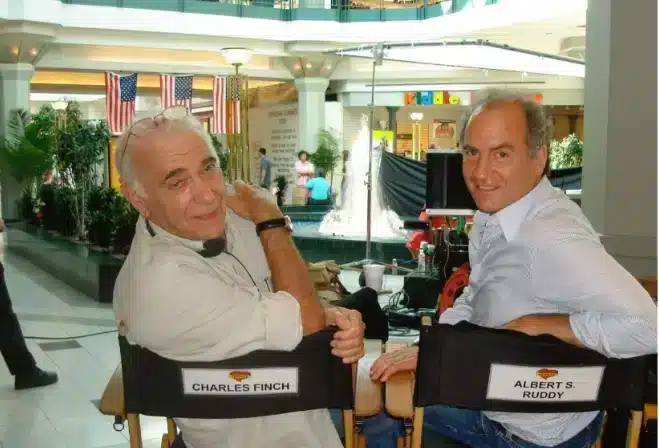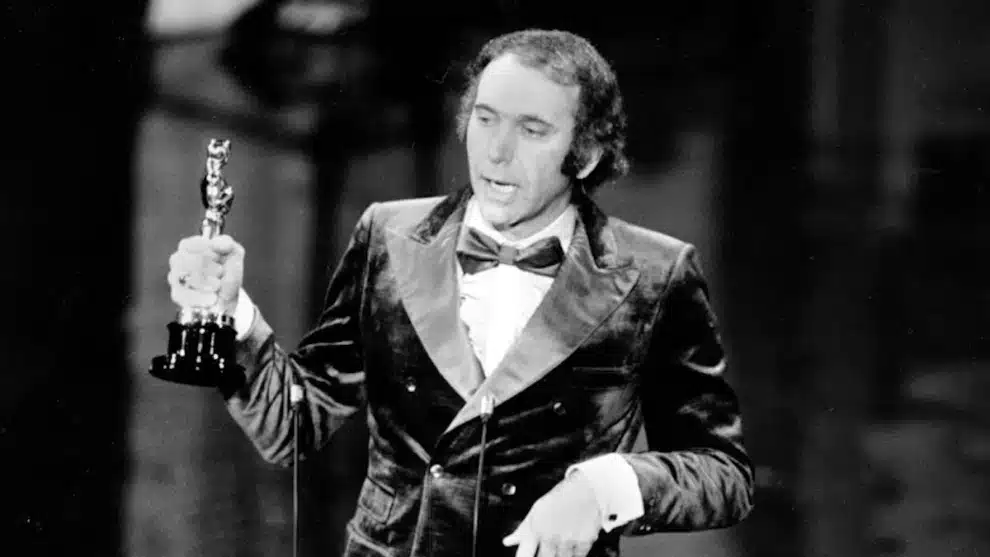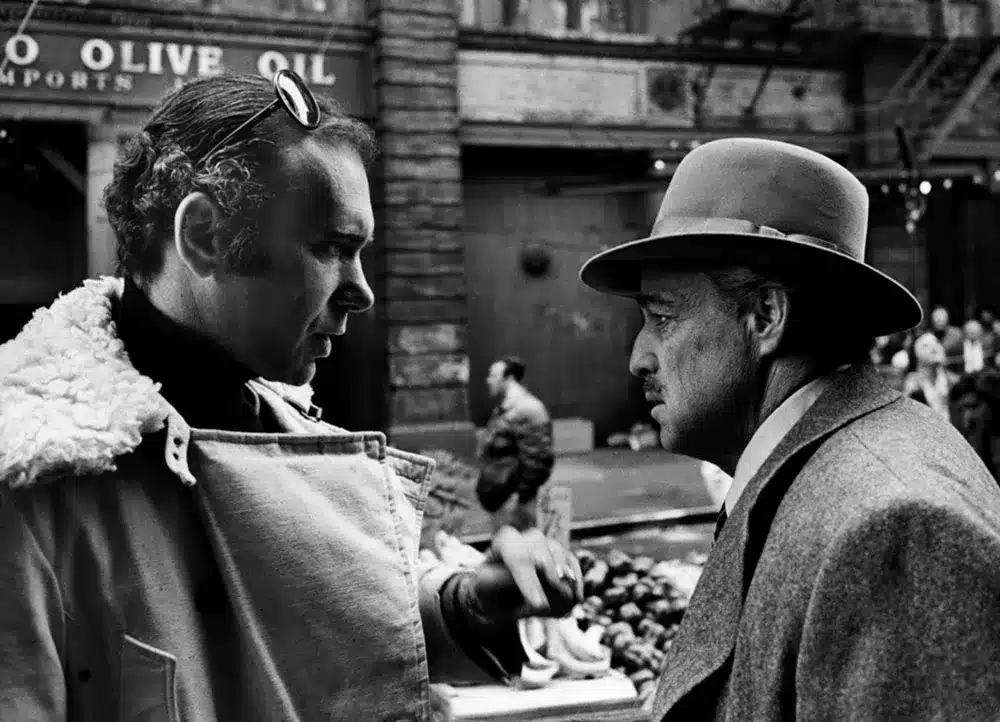
You can get lucky in Hollywood. And I don’t mean in your personal peccadillos—I mean in meeting people who take you in as a young artist and feed and clothe you with no agenda other than the goodness of their hearts. It doesn’t happen often, but I am here to tell you it does happen.
It has to be said that I have been luckier than most in my film career, with mentors including David Puttnam, Peter Guber, Nick Wechsler, Billy Gerber, and others who showed me the ropes. But Wanda McDaniel and Al Ruddy stand apart.
After my second film Where Sleeping Dogs Lie tanked, I fell into a deep funk. Wasting time licking my wounds, facing a career that was back to square one, which is how it rolls when a movie doesn’t turn out the way you hoped, first came Wanda and afterwards Al.
Wanda and I had met on the circuit. She ran the Armani press office on the West Coast and saw fit to hand me a couple of cashmere jackets which for obvious reasons are not in high demand in the LA climate. She would take me to lunch and feed me, and when despondent I would show up at her office for a chat and coffee. Wanda was elegant and beautiful and old-world and kind. She was also married to Albert S. Ruddy, the creator of Hogan’s Heroes, and the producer of The Godfather and Al—according to her—needed to meet me ASAP. Quite why Wanda thought it worth Al’s time to meet me is a mystery to this day. But meet we did.
The first time I met Ruddy he was strapped to his portable oxygen tank which he kept next to his desk in his office and used to treat his severe migraines. Two things struck me immediately: The first was that Al was in close proximity to the oxygen tank and smoking a goddamn cigar…and the second was that he wore purple-lensed aviator glasses and had a voice like a gravel pit.
If there is such a thing as love at first sight between two straight men, then this was it. Al’s humour and passion for stories…stories…stories…made sense of everything I had dreamed making movies was about. He had an absolutely pragmatic view of the picture business, as he called it. All that mattered was the story and he wasn’t going to be impressed by anything other than a great script. Al didn’t need premieres or parties or fancy restaurants. He needed scripts and people who knew how to put a good movie together. I had the great privilege of making two or three movies with this giant of a man. In Al, I found a mentor. A father figure and a friend, but more than anything, inspiration to continue making movies.
The recipient of two Academy Awards for Best Picture, Al is still making movies, and movies are being made about him. Watch The Offer, the series that tells the remarkable story of how The Godfather was made.

Al, what was the defining moment that set you on your film career?
The first moment was when I was working at the RAND Corporation, doing advanced research for the US government and the Air Force, in super combat centres and MIT research. A friend of mine, a writer, told me that he got $30,000 for writing a 20 page screenplay, which I read and said to myself, “I can do this in an hour and a half”. Which I of course did. We ended up working together and writing Hogan’s Heroes and I gave up a great career as a boy scientist. But the Russians never attacked.
You were certainly a mentor to me, and we sure had a laugh. Were there any mentors in your life?
The only mentor in my life who stands out with clarity was a director called Brian G Hutton. He studied at the studio in NY with Stella and Bill Dickie, came here, opened the Beverly Hills Playhouse, and then directed himself. When he went to London to work, he came back with a woman he loved. Unfortunately, it complicated matters, as he was happily married to his wife who he bought a home for on Mulholland Drive. He needed a place to live and asked me if he could stay at mine free of room and board. I thought, that’s no great inquisition—and I thought that for the seven years he stayed with me! At least until it got a little crowded with my wife moving in…
Tell us about your first meeting with Mario Puzo. What was it about the book that made it so great?
My first meeting with Mario, I insisted we meet in New York. The studio was against hiring him to adapt his book. What happens in Hollywood, inevitably, is that any author of a book that’s 600 pages turns a screenplay in that’s 600 pages. They wanted an acknowledged, talented screenwriter. But I insisted. I told him “Nobody wants you. You remind them of all the mistakes they made,” which was when a writer submits a script 200 pages long. He had the book under his arm, and said, “I’ll stop you there, Al… If you hire me, I promise you, I’ll never look at this book again.” And he slammed it on the floor of the hotel. I was so shocked. I didn’t know what to say, but I turned to him and went, “Mario, you just got a job”. I then brought him to the West Coast. He was a magnificent human being, and an unbelievable storyteller. It was the universality of The Godfather, which became a bestseller in every major country, that made it work. Everyone wanted a Godfather. They wanted to be entertained, taken to a new world. It was a giant homerun, and it remains so today. They’ll be doing that story till time immemorial: a great tragedy about a big man, slightly corrupted, who has his favourite son, who he wants to become the senator, president, or perhaps a banker. The one thing he didn’t want him to become is what he himself was: a gangster. And in spite of everything, and how much he tried, Michael becomes the Godfather. It breaks his heart. That is a story that will always work—even today. But you know the joke: in the mob, as soon as a Jewish gangster makes money, he sends his kid to Harvard. As soon as an Italian gangster makes money, he buys his kid a cadillac and a black silk suit [laughs].

Italian American cinema, and even culture, was greatly influenced by The Godfather. What is it about Italy that makes them such great storytellers?
I’ll tell you what I see. Gorgeous women! Sophia Loren. Great clothing designers. Giorgio Armani. Great cars—Ferrari. I hear amazing music: Nino Rota. There’s nothing more valuable to an Italian family than having great art and tradition. However—understand one very important thing—producers, actors, and directors are storytellers. The Fiddler on the Roof is a great story in its own right. And so is Mark Twain. Like The Godfather, they have survived and will continue to because the storyteller always wins. He fascinates you. He takes you into another world. It’s dream time. And that’s what we are: people who dream a lot and love to entertain people.
Which project was the best all round experience, with the least bullshit?
Every movie made had bullshit in it, because it takes bullshit to start a plant growing. Bullshit is in everything. There’s a saying that a movie is dreamed by one person who gets it through. In my life, of all the movies I made, I never made one without enormous conflict and bullshit. But the most enjoyable were two movies. One was The Longest Yard, based on a true story of a friend of mine, a handsome football player, and the tragedy of what happened to this guy. He was out of football and started degenerating. But that’s when I picked him up as a storyteller. You should know that there are 2 aspects of evaluating how much effort goes into making a movie. The first is: how hard was it to get it to be made? The hardest movie I ever got involved in was Million Dollar Baby, because who wants to see a female boxer who dies, surrounded by old guys? But the easiest movie I made was Million Dollar Baby, because I had a great director, two of the greatest actors…and so the making of the movie was easy, but getting it made was almost impossible. Three years and a lot of luck.
Has Hollywood changed forever or do you see glimmers left of the old world?
I see glimmers left of the old world, but people have been prophesying the death of Hollywood since the first train stopped in Arizona. People love movies. People love to hear stories. That will never go away. Sure, the people who run the business have changed. They’re not quite as dedicated as they used to be. But the spirit of entertainment in the movies—there’s no other group I know, including medicine, where people give their soul and heart to create their work. At least, it’s right at the top with medicine and philosophy. A world of dreamers and a world of hope. That will never vanish.
Anything to say to Charles? I miss you. What happened? Of course you won’t have this printed without my approval. It will only be added to the tab that you owe me. So Charles, I love you. Stay in touch. And next time you’re in town, give me a call.



